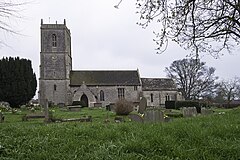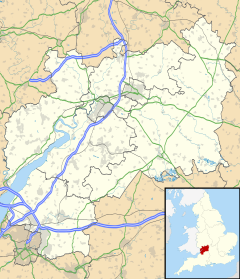Pucklechurch
| Pucklechurch | |
|---|---|
 St Thomas a Becket Church, Grade I listed C of E parish church |
|
| Pucklechurch shown within Gloucestershire | |
| Population | 2,904 |
| OS grid reference | ST698765 |
| Civil parish |
|
| Unitary authority | |
| Ceremonial county | |
| Region | |
| Country | England |
| Sovereign state | United Kingdom |
| Post town | BRISTOL |
| Postcode district | BS16 |
| Dialling code | 0117 |
| Police | Avon and Somerset |
| Fire | Avon |
| Ambulance | South Western |
| EU Parliament | South West England |
| UK Parliament | |
Pucklechurch is a village and civil parish in South Gloucestershire, England, 7.4 miles (11.9 km) ENE of the city of Bristol and 8.9 miles (14.3 km) NW of the city of Bath.
Bordering at its western boundary the Bristol Semi-Ring Road, the village forms a large eastern cluster of development on a raised area of land in the parish, the northern half of which has 14 listed buildings including the church. It is centrally well-preserved with overall a range of housing in styles of architecture and date - including, increasingly, that of the "red brick" style of which so many property developers are these days so fond. All of the main development of the village is on a knoll or escarpment which descends steeply in the west, and in a few places has long views of the Cotswolds 4 miles (6.4 km) east and land in between.
Through the far north of the parish which is farmland 0.8 miles (1.3 km) from the village centre the M4 motorway passes.
The land of Pucklechurch is relatively prominent in elevation compared to surrounding areas and as such it was selected in the Bronze Age as the site of a tumulus (round barrow) at Shortwood Hill.
Pucklechurch royal villa or palace was one of only a few in the Kingdom of Wessex and was adjoined on the west by a very large hunting forest, Kingswood, which was larger than today's settlement of the same name. The palace became prominent in the two centuries before the Norman Conquest, therefore during the early part of the Kingdom of England, before becoming wrecked. Much of its stone was later removed.
...
Wikipedia

